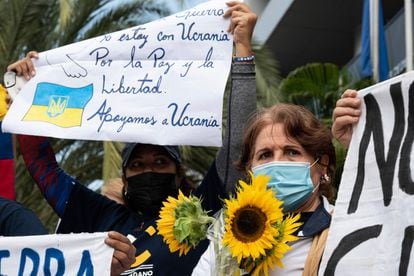Activists of the Venezuelan movement "Citizen Encounter" during a demonstration against the Russian invasion in Ukraine, this March 3 in Caracas. YURI CORTEZ (AFP)
80 years ago, in these days and in another war, a pack of five German submarines attacked the Dutch possession of Aruba, off the Venezuelan coast, and torpedoed eight tankers of different flags, sinking six of them.
The large refinery of Esso Standard, which operated on the island and supplied light Venezuelan crude oil, was attacked by the deck guns of the U-boats.
The attacks were part of the so-called Operation Neuland, launched by Hitler against the complex of oil fields and large refineries that the United States, England and the Netherlands owned in the southern Caribbean.
The great oil basin of Lake Maracaibo lacked deep-water ports and that had made Aruba, Curaçao and Trinidad appear on the Western oil map in operational proximity to Venezuela.
One of the tankers touched by the German wolves was the Monagas, with a Venezuelan flag.
Despite sustaining severe burns, her captain got almost her entire crew — 11 men — to safety before she perished, along with an unlucky wounded sailor.
The ship sank in the Gulf of Venezuela with both on board.
By 1938, Venezuela was the first exporter of crude oil in the world and the third producing country, behind the United States and the former USSR.
Only two months ago, following the Japanese attack on Pearl Harbor, his government had severed diplomatic relations with the Axis countries.
The Neuland operation was not the only one that German submarines carried out in Caribbean waters, but it was Venezuela's first encounter with what it can mean to be the little one in the schoolyard when the big ones play rough.
A tentative corollary to all this could be that when the family business is selling oil, war and its accompanying turmoil will sooner or later knock on your door.
And not necessarily for the worse.
The national oil fleet lost a tanker in 1942, but being on the side that would eventually win the contest meant that, in 1947, Venezuela was still the world's leading exporter.
It would not be for long: the emergence of the Middle East as a major world producer of light crude oil in the 1950s could mean a serious setback for Venezuela in the long term.
However, the Suez crisis in 1956, in the midst of the decolonization of Asia and Africa, and the rearrangement of Arab nationalism in the face of the voracity of the oil transnationals, gave a historic opportunity to the ideas of a distinguished Venezuelan tax lawyer, Juan Pablo Pérez. Alfonzo, which became a body in 1960 with the founding of the Organization of Petroleum Exporting Countries (OPEC).
Without OPEC, the embargo on oil shipments to the West, decreed by it in the wake of the war between Israel and a coalition of Arab countries led by Egypt and Syria, in October 1973, simply would not have been possible.
The
boom
that followed that short embargo quadrupled the income of Saudi Venezuela.
The eight years of the war between Iraq and Iran -1980 to 1988- provided a period of high prices that cushioned the cycle of devaluations that began in 1983.
Since 1998, Hugo Chávez has been strangling Venezuela's freedoms to death while financing Latin American populism during the longest price boom of the oil era.
He spent 15 years billions of dollars on Russian weapons, but contrary to his neural militarism and his anti-imperialist rants, he never went to war.
Despite being the one who dismantled the Venezuelan state oil company, Chávez never stopped selling, as long as he could, heavy crude oil to US refineries in the Gulf of Mexico.
What he leaves us with is his successor, Nicolás Maduro, and his altogether symbolic alliance with Vladimir Putin.
Putin's war is not yet 15 days old and Washington has already sent a high-level delegation to Caracas.
It is war knocking at his door.
He has been offered the opportunity of a direct understanding with Washington, with pragmatic and shady security, like everything that arises from the pressure of wars, but expeditiously and without the intermediation – or rather: without the hindrance – of Juan Guaidó and the mandarins of the faded dialogue table in Mexico.
And at the gates of an unprecedented price boom from which Venezuela, with no foreign investment other than the United States in sight, will never be able to take advantage of.
We do not have a webcam record of everything that was discussed there in such a short time, but it seems certain that Maduro will not desert his commitments to Russia.
And it will not be, by the way, for fear of a dose of Novichok from the Moscow poisoner.
His motives are others, they are roots: they are those of the perfect Latin American idiot described forever in the Montaner-Mendoza-Vargas Llosa Jr. manual.
And as such, he will harness his wagon to Vladimir Putin's Juggernaut locomotive, which, let's have it for certain, will drag him into the abyss.
Subscribe here to the EL PAÍS América
newsletter
and receive all the key information on current affairs in the region
Exclusive content for subscribers
read without limits
subscribe
I'm already a subscriber

